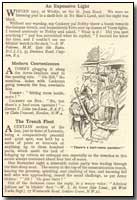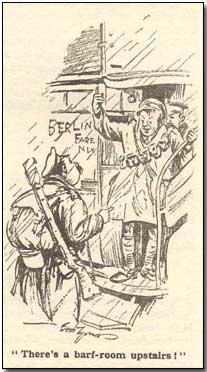Memoirs & Diaries - The Best 500 Cockney War Stories - Modern Conveniences and Other Stories
 Published in London
in 1921, The Best 500 Cockney War Stories
comprised, in the words of its newspaper publisher (The London Evening
News) "a remembering and retelling of those war days when laughter
sometimes saved men's reason".
Published in London
in 1921, The Best 500 Cockney War Stories
comprised, in the words of its newspaper publisher (The London Evening
News) "a remembering and retelling of those war days when laughter
sometimes saved men's reason".
The collection of short memoirs, some 500 in total, is divided into five categories - Action, Lull, Hospital, High Seas and Here and There. This page contains five stories from Lull, led by Modern Conveniences.
Other sections within the collection can be accessed using the sidebar to the right.
Modern Conveniences
A Tommy plugging it along the Arras-Doullens road in the pouring rain. "Ole Bill," the omnibus, laden with Cockneys going towards the line, overtakes him.
TOMMY: "Sitting room inside, mate?"
COCKNEY ON Bus: "No, but there's a barf-room upstairs!"
George T. Coles (ex-Lieut., R.A.F.), 17 Glebe Crescent, Hendon, N.W.4
The Trench Fleet
A certain section of the line, just in front of Levantie, being a comparatively peaceful and quiet spot, was held by a series of posts at intervals of anything up to three hundred yards, which made the task of bringing up rations an unhappy one, especially as the trenches in this sector always contained about four feet of water.
One November night a miserable ration party was wading through the thin slimy mud. The sentry at the top of the communication trench, hearing the grousing, splashing, and clanking of tins, and knowing full well who was approaching, issued the usual challenge, as per Army Orders: "'Alt! 'Oo goes there?"
Out of the darkness came the reply, in a weary voice: "Admiral Jellicoe an' 'is blinkin' fleet."
W. L. de Groot (late Lieut., 5th West Yorks Regt.), 17 Wentworth Road, Golders Green, N.W.11
The Necessary Stimulant
On the St. Quentin front in 1917 we were relieved by the French Artillery. We watched with rather critical eyes their guns going in, and, best of all, their observation balloon going up.
The ascent of this balloon was, to say the least, spasmodic. First it went up about a hundred feet, then came down, then a little higher and down again.
This was repeated several times, until at last the car was brought to the ground and the observer got out. He was handed a packet, then hastily returned, and up the balloon went for good.
Then I heard a Cockney voice beside me in explanatory tones: "There! I noo wot it was all the time. 'E'd forgotten his vin blong!"
Ernest E. Homewood (late 1st London Heavy Battery), 13 Park Avenue, Willesden Green, N.W.2
A Traffic Problem
A dark cloudy night in front of Lens, two patrols of the 19th London Regt., one led by Lieut. R-, the other by Corporal B-, were crawling along the barbed wire entanglements in No Man's Land, towards each other.
Two tin hats met with a clang, which at once drew the attention of Fritz.
Lieut. R- sat back in the mud, while snipers' and machine-gun bullets whistled past, and in a cool voice said, "Why don't you ring your perishing bell?"
L. C. Pryke (late 19th London Regt.), "Broughdale," Rochford Avenue, Rochford, Essex
Scots, Read This!
On the afternoon of Christmas Day, 1915, three pipers, of whom I was one, went into the trenches at Loos, and after playing at our Battalion H.Q., proceeded to the front line, where we played some selections for the benefit of the Germans, whose trenches were very close at this point.
Probably thinking that an attack was imminent, they sent up innumerable Verey lights, but, deciding later that we had no such intention, they responded by singing and playing on mouth-organs.
Having finished our performance, my friends and I proceeded on our way back, and presently, passing some men of another regiment, were asked by one of them: "Was that you playin' them bloomin' toobs?" We admitted it.
"'Ear that, Joe?" he remarked to his pal. "These blokes 'ave bin givin' the 'Uns a toon."
"Serve 'em right," said Joe, "they started the blinkin' war."
Robert Donald Marshall (late Piper, 1st Bn. London Scottish), 83 Cranley Drive, Ilford
Next - Met His Match and four other stories
"Gas Bag" was a slang term for airships.
- Did you know?

